
Face to Face is the fourth studio album by the English rock band the Kinks, released in October 1966. The album marked a shift from the hard-driving style of beat music that had catapulted the group to international acclaim in 1964, instead drawing heavily from baroque pop and music hall. It is their first album consisting entirely of Ray Davies compositions, and has also been regarded by critics as one of rock's first concept albums. Davies' blossoming songwriting style became increasingly observational and satirical, commenting on English culture, social class and the music industry.
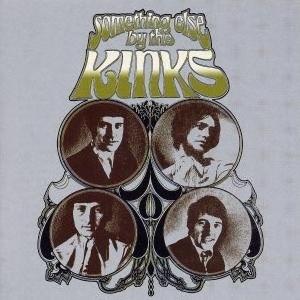
Something Else by the Kinks, often referred to simply as Something Else, is the fifth UK studio album by the Kinks, released in September 1967. The album continued the Kinks' trend toward an eccentric baroque pop and music hall-influenced style defined by Ray Davies' observational and introspective lyrics. It also marks the final involvement of American producer Shel Talmy in the Kinks' 1960s studio recordings; henceforth Ray Davies would produce the group's recordings. Many of the songs feature the keyboard work of Nicky Hopkins and the backing vocals of Davies's wife, Rasa. The album was preceded by the singles "Waterloo Sunset", one of the group's most acclaimed songs, and the Dave Davies solo record "Death of a Clown", both of which charted in the UK top 3.

"A Well Respected Man" is a song by the British band the Kinks, written by the group's lead singer and rhythm guitarist Ray Davies, and originally released in the United Kingdom on the EP Kwyet Kinks in September 1965. The song was released on the album Kinkdom in the United States. It was also released as a single in the US and Continental Europe.

Kinda Kinks is the second studio album by the English rock band the Kinks. It was released on 5 March 1965 in the United Kingdom by Pye Records. The original United States release, issued by Reprise Records on 11 August 1965, omits three tracks and substitutes the singles "Set Me Free" and "Ev'rybody's Gonna Be Happy". Recorded and released within two weeks after returning from a tour in Asia, Ray Davies and the band were not satisfied with the production.
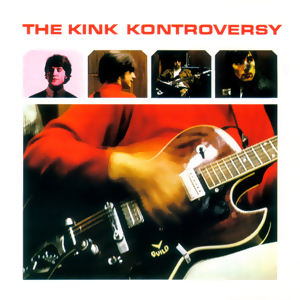
The Kink Kontroversy is the third studio album by the English rock band the Kinks. It was released on 26 November 1965 in the United Kingdom by Pye Records. Issued in the United States by Reprise Records on 30 March 1966, it was the Kinks' first American album to feature an identical track listing to its British counterpart. It is a transitional work, with elements of both the earlier Kinks' styles and early indications of the future direction of Ray Davies' songwriting styles. The liner notes were written by Michael Aldred.

The Kinks, an English rock band, were active for over three decades, from 1963 to 1996, releasing 24 studio albums and four live albums. The first two albums are differently released in the UK and the US, partly due to the difference in popularity of the extended play format, and partly due to the US albums including the hit singles, and the UK albums not; after The Kink Kontroversy in 1965 the albums were the same. Between 100 and 200 compilation albums have been released worldwide.
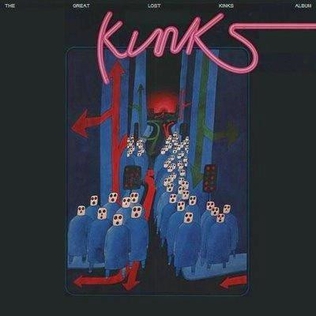
The Great Lost Kinks Album is a compilation album by the English rock band the Kinks. Released in the United States in January 1973, it features material recorded by the group between 1966 and 1970 that had mostly gone unreleased. The compilation served to satisfy Reprise Records after executives determined that the Kinks contractually owed them one more album, despite the band's departure from the label in 1971.

The Kinks were an English rock band formed in Muswell Hill, North London, in 1963 by brothers Ray and Dave Davies. They are regarded as one of the most influential rock bands of the 1960s. The band emerged during the height of British rhythm and blues and Merseybeat, and were briefly part of the British Invasion of the United States until their touring ban in 1965. Their third single, the Ray Davies-penned "You Really Got Me", became an international hit, topping the charts in the United Kingdom and reaching the Top 10 in the United States.

Percy is a 1971 film soundtrack for the British comedy film Percy performed by the English rock group the Kinks with additional orchestral arrangements conducted by Stanley Myers. It was released as the band’s ninth official studio album. The songs were written by Ray Davies and include both standard rock/pop songs and instrumental numbers.

Four More Respected Gentlemen is an unreleased album by the English rock band the Kinks. The project arose out of the band's different American contract schedule, which obligated them to submit a new LP to Reprise Records in June 1968. As the band continued recording their next album, released later in the year as The Kinks Are the Village Green Preservation Society, bandleader Ray Davies submitted fifteen completed master tapes to Reprise. The label planned to issue the LP in the US in November 1968 but abandoned the project only a month beforehand for unclear reasons.
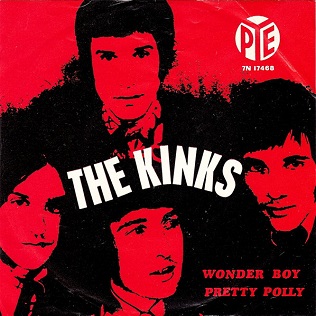
"Wonderboy" is a song by the English rock band the Kinks, released as a single in 1968. It stalled at number 36 in the UK charts, becoming the band's first single not to make the UK Top Twenty since their early covers. Despite this, it became a favourite of John Lennon of the Beatles, and, according to Ray Davies in his autobiography, X-Ray, "someone had seen John Lennon in a club and he kept on asking the disc jockey to play 'Wonder Boy' [sic] over and over again." Kinks guitarist Dave Davies praised the song, saying, "'Wonderboy' was a big one for us although it wasn't a hit. That was one song we really felt something for." However, bassist Peter Quaife's opinion towards the track was low, later stating that "[I] hated it ... it was horrible."

"Tired of Waiting for You" is a song by the English rock band the Kinks. It was released as a single on 15 January 1965 in the UK and on 17 February 1965 in the USA. The single reached number one in the UK and number six in the US. It then appeared on their second studio album, Kinda Kinks. It was the group's highest-charting single in the US - tied with "Come Dancing", which achieved the same chart position eighteen years later in 1983.

The Kinks Greatest Hits! is a compilation album by the English rock band the Kinks. Released in the United States in August 1966 by Reprise Records, the album mostly consists of singles issued by the group between 1964 and 1966. The band's first greatest hits album, it remained on the Billboard Top LPs chart for over a year, peaking at number 9, making it the Kinks' highest charting album in the US. The album was in print for decades and was the Kinks' only gold record in America until 1980.

Kwyet Kinks is the third extended play by the English rock band the Kinks. It was released on 17 September 1965 in the United Kingdom by Pye Records. Driven by the inclusion of the song "A Well Respected Man", Kwyet Kinks topped sales charts in Britain for several weeks. In the United States, which had no corresponding market for EPs, Reprise Records instead used its songs as the basis for the November 1965 LP Kinkdom.

Kinks-Size is a studio album by the English rock band the Kinks, released as their second album in the United States. It was issued by Reprise Records in March 1965 in both mono and simulated stereo formats. It peaked at number 13 on the Billboard album chart in the third week of June 1965, the same week the Kinks began their first US tour. It is the Kinks' fourth-highest charting album on the Billboard album chart and the second-highest of their 1960s albums. The album ranked number 78 on Billboard's year-end album chart for 1965.
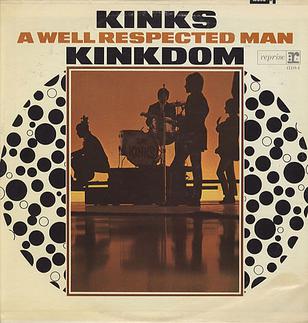
Kinkdom is a studio album by the English rock band the Kinks, released as their fourth album in the United States. It was issued by Reprise Records on 24 November 1965 in both mono and simulated stereo formats. It peaked at number 47 on the Billboard album chart.

"Picture Book" is a song by the English rock band the Kinks from their 1968 album The Kinks Are the Village Green Preservation Society. Written and sung by Ray Davies, the song's lyrics describe the experience of an ageing narrator flipping through a photo album reflecting on happy memories from "a long time ago". Recorded in May 1968, its cheerful sound is defined by the jangle of an acoustic twelve-string guitar and a disengaged snare drum. In continental Europe, the song was issued as the B-side of the album's lead single, "Starstruck", in November 1968. The same single was issued in the United States in January 1969, though it failed to appear in any charts.
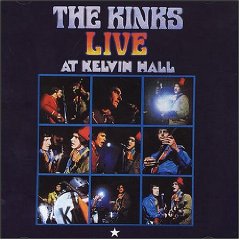
Live at Kelvin Hall is a live album by the English rock group the Kinks. It was recorded at Kelvin Hall in Glasgow, Scotland, in early 1967 and released in August 1967 in the US, and January 1968 in the UK. Live at Kelvin Hall received mixed reviews upon release, and sold poorly.

"Berkeley Mews" is a song by the English rock band the Kinks. It was released on a non-album single in June 1970, as the B-side to "Lola". Written and sung by bandleader Ray Davies, the song was recorded in early 1968 during the sessions for The Kinks Are the Village Green Preservation Society (1968). The title references a small street in London, while the lyrics recount a one-night stand. Influenced by the music of the 1940s, the song employs a heavier production than was typical for the band's 1968 work.

Then Now and Inbetween is a promotional compilation album by the English rock band the Kinks. Reprise Records issued the album in July 1969 to journalists, radio program directors and disc jockeys in conjunction with the "God Save the Kinks" promotional campaign, which sought to reestablish the Kinks' commercial status in the US after their four-year ban on performing in the country.



















